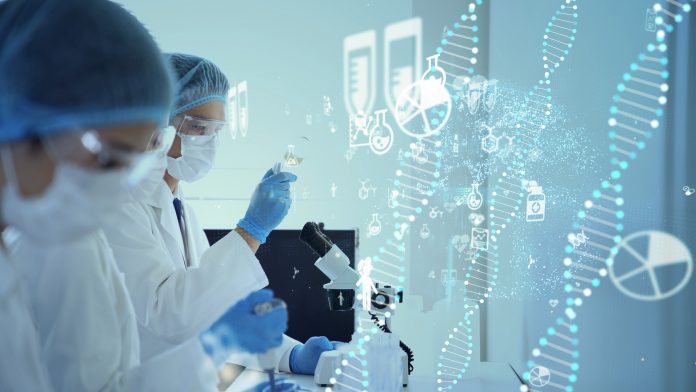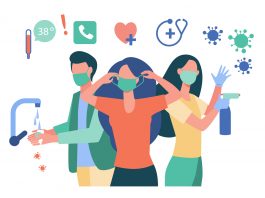Undiscovered European AI biotech company Aladdin Healthcare Technologies continues to build novel technologies and achieve new milestones to combat age-related disease.
Aladdin Healthcare Technologies is based in London, UK, and has assembled some of the world’s leading Artificial Intelligence (AI) engineers, scientists, biologists, and innovators. The company was founded as a response to the moderate progress that has been made to combat age-related diseases such Alzheimer’s, Parkinson’s, cardiovascular diseases, and prostate cancer.
The company’s mission is to transform the drug discovery and diagnosis process by developing game-changing technologies and approaches that deliver superior results much faster and that are more cost effective than traditional routes in an effort to move age-related healthcare and medicine to a superior level. Using machine learning and AI technology combined with multimodal data, Aladdin has succeeded in building a platform for the early diagnosis of Alzheimer’s disease and COVID-19, surpassing clinical practice accuracy standards for early diagnosis.
Aladdin’s team and AI awards and publications
Aladdin’s AI team consists of senior members with successful commercial product experience and backgrounds from Oxford University, Imperial College, Cambridge University, and the Karolinska Institute. The team has won more than 30 global AI competitions, including ACM, IEEE, and Data Science Bowl 2019, with two of the Kaggle Grand Masters who rank top 100 in Kaggle Community (Kaggle is the largest and eminent data science community, with more than 1.3 million data scientists globally.)
Our solutions have achieved 30+ AI awards, including the following:
- ACM KDD CUP 2018 AI Contest (first place);
- Digital China Innovation Contest Grand Final, DCIC 2019 (first place);
- China Innovation and Creativity Competition (ICC) 2018 (first place);
- 2018 CCF Big Data & Computational Intelligence Contest (first place); and
- 2018 Meinian OneHealth Hypertension Prediction Contest (first place).
The scientific team
Aladdin’s scientific team is composed of globally recognised scientists in the field of age-related disease, including professors from Cambridge University, Imperial College London, Norwegian Centre on Healthy Ageing, and Oslo University. The publications created by the scientific advisory team have been cited more than 120,000 times.
Our chief scientific advisor, Professor David Rubinsztein, is the Deputy Director of the Cambridge Institute of Medical Research (CIMR) and the Academic Lead of the Alzheimer’s Research UK (ARUK) Cambridge Drug Discovery Institute. He is also a Professor of Molecular Neurogenetics at the University of Cambridge and a UK Dementia Research Institute Professor.
Our scientific group has collectively published more than 1,000 papers in leading scientific journals, including more than 100 papers in Nature, Science, and Cell in both main and subgroups.
A unique business approach
The company focuses on two key areas:
- AI drug discovery, using our proprietary disease-centric knowledge graphs in conjunction with an award-winning AI drug discovery platform to speed up the traditional drug discovery process at the preclinical phase. In the future, we will be able to provide end-to-end solutions for the drug discovery process; and
- Early stage disease diagnosis: to create a gold standard for early stage diagnosis, we use our proprietary AI in conjunction with extensive multimodal data sets from multiple countries to make new discoveries.
In the case of Alzheimer’s disease, we are ultimately targeting a non-invasive test that will be simple to implement, more accurate than current clinical standards, and affordable for the majority of the world’s population.
AD multimodal data and biomedical knowledge graph/map
Aladdin is one of most innovative AI companies that uses extensive multimodal data approaches for drug discovery and biomarker discovery for dementias, including Alzheimer’s disease. In addition to small molecule compounds libraries and publications from PubMed, Aladdin has access to extensive longitudinal datasets consisting of cognitive test results, general blood tests, EMRs, genetic risk profiling, MRI, PET, CSF, walking patterns, and other unique data. To complement new small molecule drug discoveries, the company is building biomedical knowledge graphs around age-related disease to achieve target identification, pathological pathway discovery, mechanism analysis, and drug repurposing. The knowledge graph can help to discover novel actionable insights, mechanisms, and potential drug treatments by uncovering key relationships between disease, genes, chemical compounds, and drugs.
Alzheimer’s disease
Through the use of advanced text mining techniques, Aladdin’s AI team was able to extract biomedical knowledge from over 30 million research articles on Alzheimer’s disease and construct a large scale of knowledge graph, with more than 800,000 entities and over 10 million edges among diseases, targets, compounds, biomarkers, and genes. We will enter a consortium agreement with the Dementia Platform UK to further develop and license the AD knowledge graph in 2021: the consortium consists of four of the top 10 European Big Pharma stakeholders.
COVID-19
We have taken a further step in fighting against the coronavirus pandemic by constructing a COVID-19-centric knowledge graph through the text mining of over 47,000 scholarly articles about COVID-19 and related coronaviruses. This includes further information on the transmission, incubation, and environmental stability of COVID-19; as well as data about risk factors, genetics, origin, and further development. At the same time, we hope to build a larger knowledge base of potential vaccines and therapeutics. Our knowledge graph for COVID-19 predicted the use of dexamethasone as a potential aid for the disease in March 2020.
Extensive international data cohorts
One of the Holy Grails for using significant data in healthcare for discovery is having access to data from phenotypes originating outside Europe, such as African, Indian etc. Aladdin is building up access to data from Europe, China, India, and the Middle East; and believes this diversity is paramount for creating an eventual global solution.
This gives Aladdin an advantage which will be catalysed by Aladdin building new disease risk assessment platforms that will enable all data to be gathered and stored in a digital machine-readable format. This is an exciting way forward, as traditional EMRs – whether from the US or UK – are generally incomplete and in different formats, which make it very difficult for machine learning.
Recent achievements
Drug discovery platform
We provide valuable solutions to the pharmaceutical industry via our proprietary AI drug discovery platform that can accelerate the drug development process, including Virtual Screening, Hit to Lead, and Lead Optimisation. We have rapidly identified multiple small molecule drug compounds with a high potential for novel approaches for multiple age-related conditions, including Alzheimer’s disease and Parkinson’s disease, as well as for COVID-19. For example, the AI virtual screen functionality of the Aladdin drug discovery platform achieved a recommendation success rate 40 times higher than traditional screening methods through recent co-operation with Oslo University.
Based on the drug discovery platform, Aladdin has also successfully identified dexamethasone, a low-dose steroid treatment, as the leading potential repurposed drug candidate. Aladdin has presented its medical paper on COVID-19 centred knowledge graph at the ACM SIGKDD annual conference, the world premier forum for data mining.
COVID-19 EU Innovative Medicines Initiative (EU IMI) project
Aladdin has become a member of a high-level consortium sponsored by EU IMI under the name ‘Project Dragon’. The project aims to develop a precision medicine approach culminating in a scalable diagnostic tool for COVID-19, initially utilising extensive patient data from around the globe.
Over and above the Dragon Project, we have independently validated our high-level capability in the COVID-19 AI diagnostic space. We have developed a fully automated deep learning process to detect and distinguish COVID-19 from other pulmonary diseases from CT images. Our research study has been published on IEEE.
Health risk assessment platform
Aladdin has recently launched its health risk assessment tool to Airbus and Saregama in India.
Aladdin’s publications
- Weakly supervised deep learning for COVID-19 infection detection and classification from CT images;
- The NAD+-mitophagy axis in healthy longevity and in artificial intelligence based clinical applications;
- Biomedical knowledge graph of COVID-19: construction and applications;
- Communicative representation learning on attributed molecular graphs; and
- To improve the predictions of binding residues with DNA, RNA, carbohydrate, and peptide via multiple-task deep neural networks.
Core team members’ publications
In addition to those mentioned above, we also have a Chinese team, one of the core members of which is Shuangjia Zheng. Zheng is leading a team of award-winning AI team members, and his publications can be found here.
In 2020 we began working closely with the following scientists, who act as our advisors and with whom we have several ongoing publications:
Wade Menpes-Smith
Chief Executive Officer
Aladdin Healthcare Technologies
+44 203 302 9762
info@aladdinid.com
www.aladdinid.com
www.linkedin.com/company/aladdin-healthcare-technologies
Please note, this article will also appear in the third edition of our new quarterly publication.









